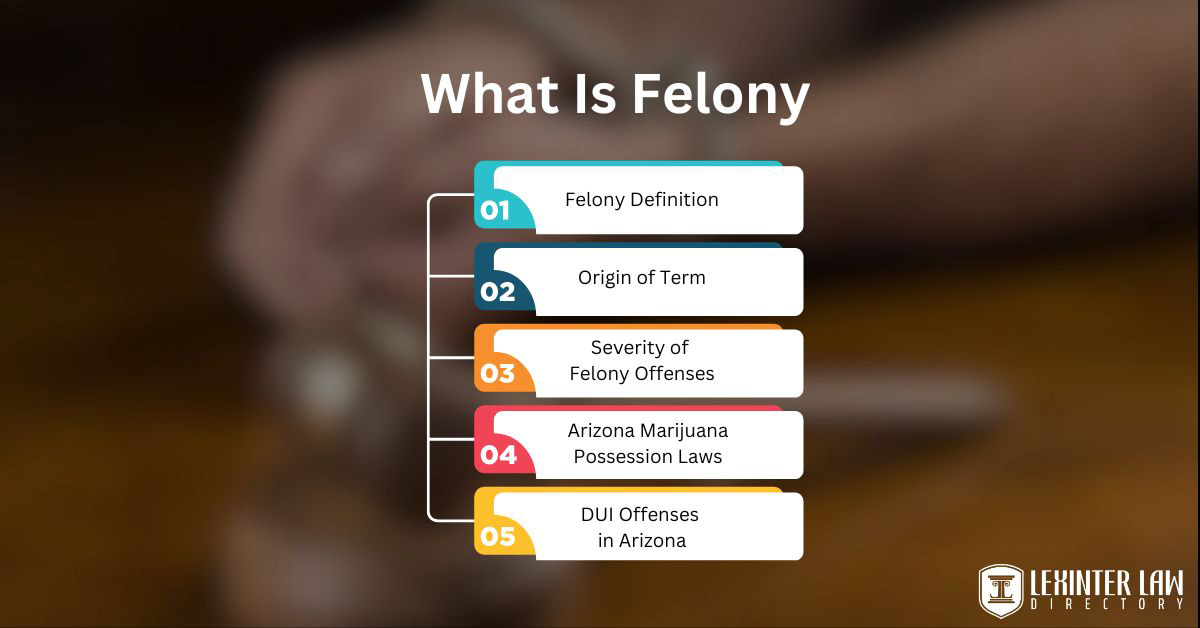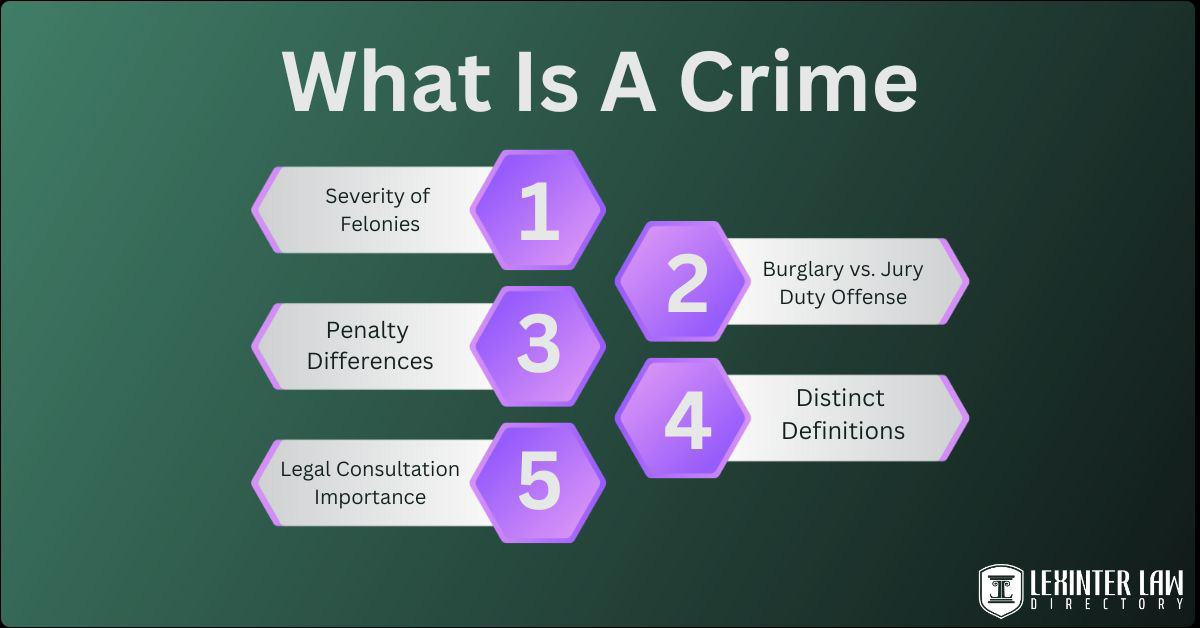Felony vs Crime
How can you tell the difference between felony vs crime? It’s important to know whether you are charged with committing a felony or a crime so that you know what your sentence might be if you’re convicted of the offense, what options you have in court, and how serious of an offense it is you are charged with. Here are the main differences between felony and crime to help you better understand these charges and how they will affect your future if you are convicted of either one.
Table of Contents
What Is Felony

A felony is a criminal offense that’s punishable by death or imprisonment for more than 1 year. In most states, a felony is a crime that’s punishable by more than one year in state prison. A felony can also be a federal crime that’s punishable by more than one year in federal prison. The term felony comes from the Latin word for free man. A person who has been convicted of a felony is called a felon.
You may have heard someone say “I was caught with weed so it must not be a big deal” but Arizona law defines possession of marijuana as being punished as if it were found to contain any other narcotic substance such as cocaine or heroin. Consequently, if you are convicted of possession of marijuana in Arizona you will receive the same punishment as if you had possessed cocaine and heroin. And just because your crime doesn’t carry the threat of the death penalty doesn’t mean it’s a misdemeanor.
Let’s take DUI as an example. Many drivers assume that because they only get slapped on the wrist with community service or fines instead of going to jail they’re committing a mere traffic violation rather than drunk driving which is punishable by six months in jail. But felony DUI Arizona offenses are misdemeanors in Arizona which means no matter how much alcohol there is in your system, you’ll face at least four months behind bars if convicted, and even worse, you’ll lose your license for up to three years which means at least 18 months without driving privileges even though this time could stretch indefinitely since there’s no definite end date like probation would provide after sentencing ends!
What Is A Crime

There are many different types of crimes, but they can generally be divided into two categories: felonies and misdemeanors. Felonies are the more serious of the two and can result in prison sentences of one year or more. Misdemeanors, on the other hand, are less serious offenses that typically result in fines or shorter jail sentences. Felonies tend to be classified as more severe crimes because they often involve serious consequences like death, significant property damage, or physical injury.
For example, a burglary is a felony crime because it involves unauthorized entry into someone’s home with the intent to commit a crime there. A misdemeanor might include not being able to show up for jury duty without giving notice; this is punishable by only a fine and does not carry any criminal penalties. In general, felonies tend to involve harsher penalties than misdemeanors; however, sometimes people who commit minor offenses may also receive felony charges if their record has previously included convictions for other criminal activities.
As you can see, although crimes and felonies are often used interchangeably, there are distinct differences between them. While most crimes are felonies, not all felonies are crimes. Felonies must be classified as more serious offenses than misdemeanors, which include traffic violations and other minor acts that do not carry criminal penalties. If you need help understanding how to tell if your offense is a felony or misdemeanor, it’s crucial to consult with a lawyer who specializes in these types of cases.
9 Key Differences Between Felony Vs Crime
Understanding the difference between a felony and a crime is very important. A felony is a serious type of crime, but not all crimes are felonies. Crimes can also be minor, with lighter penalties and fewer long-term effects. Felonies, however, are much more severe and have greater consequences. Here is a table summarizing the main differences between felonies and other crimes for a clear and concise understanding.
| Aspect | Felony | Crime (Less Severe) |
|---|---|---|
| Severity of Offense | Very serious crimes like murder or armed robbery. | Less serious crimes like shoplifting or speeding. |
| Legal Impact | Can result in loss of rights, such as voting or owning firearms. | Usually does not remove legal rights. |
| Penalty Type | Severe penalties, often over one year in prison or the death penalty. | Lighter penalties like fines or less than one year in jail. |
| Court Involvement | Handled in higher courts, often with a jury trial. | Resolved in lower courts, usually without a jury. |
| Authority Handling Cases | Managed by state or federal authorities, involving more resources. | Handled by local police and courts. |
| Resolution Process | Takes longer, involves investigations, hearings, and trials. | Resolved quickly, often with a single court appearance or fine. |
| Record Implications | Stays on record for life, very hard to remove. | Often stays on record for a shorter time, can be expunged. |
| Impact on Employment | Makes it very hard to find jobs, especially in trusted positions. | Less impact, minor offenses are often overlooked by employers. |
Severity Of Offense
A felony is a very serious offense. Examples include murder, armed robbery, or drug trafficking. These crimes often harm people, property, or society. A crime can also be minor, such as speeding, shoplifting, or public intoxication. Felonies are more severe than other types of crimes. For example, stealing a car is a felony, but stealing a small item from a store is not. Felonies are always treated with more seriousness.
Legal Impact
Felonies can lead to losing important rights. For example, a person convicted of a felony may lose their right to vote, serve on a jury, or own a firearm. Crimes that are less severe do not usually take away these rights. For example, someone convicted of a small offense like trespassing or disorderly conduct may still keep their basic legal rights. Felonies cause much greater legal problems than less serious crimes.
Penalty Type
Felonies have harsher punishments. People convicted of a felony often go to prison for more than a year. In very serious cases, like murder, a person could get life in prison or the death penalty. Less severe crimes, like misdemeanors, usually have lighter penalties. These might include paying fines, doing community service, or serving less than one year in jail. Felonies always have more severe penalties than other crimes.
Court Involvement
Felony cases are handled in higher courts. They involve more steps and often require a trial with a judge and jury. These cases take longer and need more evidence to prove guilt. Less serious crimes, like misdemeanors, are handled in lower courts. These cases are simpler and may be resolved quickly without a trial. Felony cases are always more complicated than other types of crimes.
Authority Handling Cases
Felonies require involvement from state or federal authorities. For example, serious crimes like drug trafficking or homicide may involve FBI agents or state investigators. Less severe crimes, like minor theft or traffic violations, are handled by local police and courts. Felonies are managed by higher-level agencies because they are more serious, while minor crimes are handled locally.
Resolution Process
Felonies take more time to resolve. These cases involve long investigations, multiple hearings, and often a trial. A plea deal might be offered, but it takes time to arrange. Less serious crimes are resolved faster. Many only involve paying a fine or attending court once. Felony cases are more complex, while other crimes are resolved more quickly and with fewer steps.
Record Implications
A felony stays on a person’s record for life. This means it will always appear in background checks for jobs, housing, or loans. It is very hard to remove a felony from a record. Minor crimes, like misdemeanors, stay on a record for a shorter time, usually up to seven years. Some of these records can even be erased, or expunged. Felonies, however, always have bigger effects on a person’s record.
Impact On Employment
Felony convictions make it hard to find a job. Many employers will not hire someone with a felony record, especially for positions of trust or responsibility. Minor crimes have less impact on job opportunities. For example, a small fine or a traffic ticket might not matter to most employers. Felonies, like theft or assault, make finding work much harder than other types of crimes.
Long-Term Consequences
Felonies cause long-term problems. A person convicted of a felony may lose their voting rights, face restrictions on travel, or struggle to find housing. They may also be seen differently by their community. Less severe crimes do not have as many lasting effects. For example, paying a fine or serving community service might not cause future problems. Felonies, however, can affect a person’s life forever.
The Circumstances Surrounding Felony Vs Crime

Felonies and crimes are treated differently based on how serious they are. Felonies are the most severe type of crime and have strict punishments. Less serious crimes, like misdemeanors, have lighter penalties. It is important to understand how these differences affect punishment, the types of offenses involved, and how laws like Arizona’s categorize felonies. Knowing this can help people understand the legal system and the consequences of these offenses.
Punishment Severity
The punishment for felonies is very serious. A person convicted of a felony can go to prison for more than one year. In some cases, they may face the death penalty. For example, someone guilty of murder might be sentenced to life in prison or execution. Crimes that are not felonies, like misdemeanors, have lighter punishments. A person convicted of a misdemeanor might only pay a fine or serve less than one year in jail. Felonies always have harsher penalties than minor crimes.
Examples Of Offenses
Felonies include crimes like murder, robbery, and arson. These offenses often involve violence or major harm to property. For example, setting fire to a building is arson, which is a felony. Another example is stealing a car, which is a serious theft crime. Crimes that are not felonies include traffic violations or petty theft. For example, stealing a candy bar from a store is a minor crime, not a felony. The seriousness of the offense decides if it is a felony or a lesser crime.
Arizona Felony Degrees
In Arizona, felonies are divided into four degrees. First-degree felonies are the most severe. They include crimes like murder or kidnapping. Second-degree felonies are still very serious, such as aggravated assault. Third-degree felonies are less severe but still carry prison time, like some types of theft. Fourth-degree felonies are the least severe and might only result in probation. These degrees help courts decide punishments based on the seriousness of the felony. Arizona law treats all felonies very seriously.
FAQs
1. What Defines A Felony Versus A Crime?
A felony is a serious crime that can lead to over a year in prison or even the death penalty. Crimes can also include less serious offenses like misdemeanors. Misdemeanors usually result in lighter punishments, such as small fines or jail time under one year. Felonies are severe and carry harsher consequences.
2. Can Felonies Be Reduced To Misdemeanors?
Yes, some felonies can be reduced to misdemeanors. This usually happens through plea bargains, where the defendant agrees to plead guilty to a lesser charge. Courts might also reduce felonies based on the circumstances of the case, the defendant’s criminal history, or any changes in evidence.
3. Do All Crimes Result In A Criminal Record?
No, not all crimes result in a criminal record. Serious crimes like felonies and most misdemeanors are recorded and show up in background checks. Minor offenses, such as parking violations or traffic tickets, do not. Whether a crime appears on a record often depends on its severity and how the court handles it.
4. How Does A Felony Impact Civil Rights?
A felony conviction can take away important rights. Felons may lose the right to vote, serve on a jury, or own firearms. These restrictions vary by state or country. In some cases, civil rights can be restored after serving a sentence, but this process is often lengthy and difficult.
5. Are Crimes Always Punishable By Jail Time?
No, not all crimes lead to jail time. Minor crimes, like traffic violations, often result in fines or community service. More serious crimes, such as felonies, are more likely to include jail or prison time. The punishment depends on the nature of the crime and the decision of the court.
Conclusion
If you or someone you know has been charged with a crime, it is important to understand the difference between a felony and a crime. A felony is a more serious offense that’s punishable by imprisonment for more than 1 year or death. A crime is less serious and is punishable by a fine, probation, or incarceration for less than one year. For this reason, if you are accused of either a felony or a crime, it is important to hire an experienced criminal defense attorney in Phoenix who can help protect your rights during this time.

